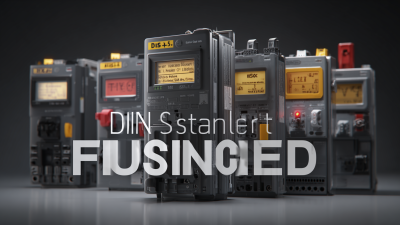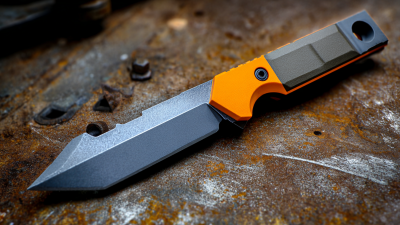
-
Home
-
About Us
-
Products
-
News
-
Blog
-
Contact Us
Leave Your Message

In today's rapidly evolving electrical industry, selecting the suitable components for your system is crucial for maintaining safety and efficiency. Among these components, the J Slotted Fuse stands out as a vital protective device, designed to safeguard electrical circuits from overloads and short circuits. According to the latest industry reports, a staggering 80% of electrical failures can be traced back to improper fuse choices, emphasizing the significance of choosing the right J Slotted Fuse for your specific requirements. These fuses not only ensure optimal performance but also reduce the risk of catastrophic failures and system downtime. As the demand for reliable and efficient electrical solutions continues to surge, understanding the intricacies of J Slotted Fuses becomes imperative for professionals across various sectors. This blog discusses essential factors to consider when selecting the ideal J Slotted Fuse, helping you make informed decisions that align with your electrical needs.

 When it comes to electrical applications, J slotted fuses are a popular choice due to their reliability and ease of installation. These fuses feature a slot for quick and simple replacement, which makes them particularly useful in environments requiring frequent maintenance or rapid response times. Common applications for J slotted fuses include industrial equipment, HVAC systems, and power distribution panels. Understanding the specific requirements of your electrical system is crucial to selecting the appropriate fuse.
When it comes to electrical applications, J slotted fuses are a popular choice due to their reliability and ease of installation. These fuses feature a slot for quick and simple replacement, which makes them particularly useful in environments requiring frequent maintenance or rapid response times. Common applications for J slotted fuses include industrial equipment, HVAC systems, and power distribution panels. Understanding the specific requirements of your electrical system is crucial to selecting the appropriate fuse.
Tip: Always check the voltage and amperage ratings of your existing fuses before replacement. This ensures compatibility and prevents potential electrical hazards. Additionally, consult the equipment manufacturer's specifications to determine the type of fuse that best meets the requirements of your machinery.
Another essential aspect to consider is the environment in which the fuse will be used. J slotted fuses come in various materials and ratings, making them suitable for different conditions, such as high-temperature or dusty settings. Selecting a fuse designed for your specific operating conditions can significantly enhance the safety and longevity of your electrical system.
Tip: Make it a practice to regularly inspect your fuses and replace them as necessary, as worn-out fuses can compromise the safety and efficiency of your electrical systems.
When selecting the appropriate J slotted fuse, understanding the specifications that align with your electrical needs is crucial. First and foremost, you should determine the voltage and current ratings required for your application. These ratings ensure that the fuse can safely handle the electrical load while providing optimal protection against overloads and short circuits. It's essential to select a fuse that matches or slightly exceeds the operational current to maintain efficiency and prevent nuisance blowing.
Additionally, consider the physical dimensions and mounting style of the J slotted fuse. The size needs to fit within the designated space in your electrical system, while the mounting style should be compatible with your existing hardware. Pay attention to the fuse's response time as well, as some applications may require faster acting fuses for immediate protection against surges. By identifying these key specifications, you can make an informed decision that not only enhances the safety of your electrical system but also optimizes its performance.
When utilizing J slotted fuses, users often encounter several common issues that can impact the effectiveness and reliability of their electrical systems. One prevalent challenge is the difficulty in properly selecting the right fuse amperage. If the amperage is set too low, it may blow frequently, disrupting operations. Conversely, selecting a fuse with a higher amperage than necessary can lead to equipment damage during overload situations, as the fuse may not activate in time to protect sensitive components.

Another common problem is the physical installation of J slotted fuses. Incorrect alignment or mounting can hinder the fuse's performance and lead to poor electrical contacts. Additionally, users may experience frustration when attempting to find compatible replacement fuses, particularly in older equipment or less common specifications.
It's crucial to keep track of the specifications and dimensions of the fuses used to avoid these compatibility issues. Understanding these challenges can help users make informed decisions when choosing and maintaining their J slotted fuses, ensuring a more reliable electrical system.
When it comes to maintaining the optimal performance of J slotted fuses, regular inspection and testing are paramount. According to a report by the Institute of Electrical and Electronics Engineers (IEEE), approximately 30% of electrical failures in industrial settings can be attributed to improper maintenance of protective devices like fuses. Routine checks can prevent overheating and ensure that the fuses are functioning at their ideal capacity, which typically operates within a temperature range of 20°C to 60°C.
Moreover, it's essential to ensure that the J slotted fuses are matched accurately to their applications. A study conducted by the National Fire Protection Association (NFPA) reveals that selecting the wrong fuse can lead to electrical hazards, accounting for nearly 25% of electrical fires in commercial buildings. By adhering to the manufacturer's specifications and guidelines when replacing or installing fuses, you can enhance safety and reliability in your electrical systems. Regular maintenance, coupled with correct selection, not only extends the lifespan of the fuses but also contributes to the overall safety and efficiency of electrical operations.
When it comes to selecting and installing J slotted fuses, understanding when to seek professional help is crucial. In the electrical industry, particularly for high-voltage systems, incorrect fuse selection can lead to severe operational failures. According to the National Fire Protection Association (NFPA), improper fuse applications accounted for about 30% of electrical fire incidents in commercial buildings in recent years. If you are unsure about the specifications or the load requirements of your systems, consulting a certified electrician or engineer is highly recommended.
Moreover, the installation of J slotted fuses involves ensuring proper integration with your electrical infrastructure. The Electrical Safety Foundation International (ESFI) reports that many overcurrent protection issues arise from improper installation procedures, which can lead to reduced efficiency and increased risk of equipment failure. Given the potential hazards and complexities involved, professional assistance not only ensures compliance with the National Electrical Code (NEC) but also enhances safety, prolongs equipment lifespan, and mitigates the risk of costly operational downtimes.
Thus, when facing ambiguity in fuse selection or installation processes, reaching out to qualified professionals becomes a prudent decision.





